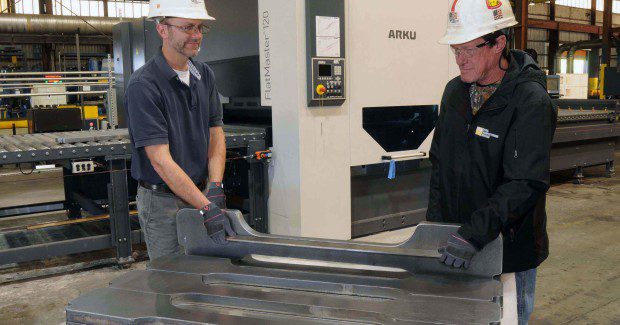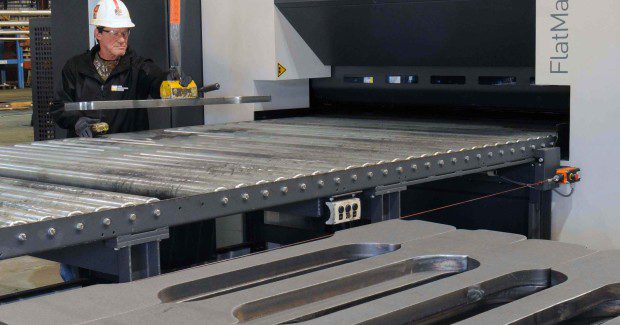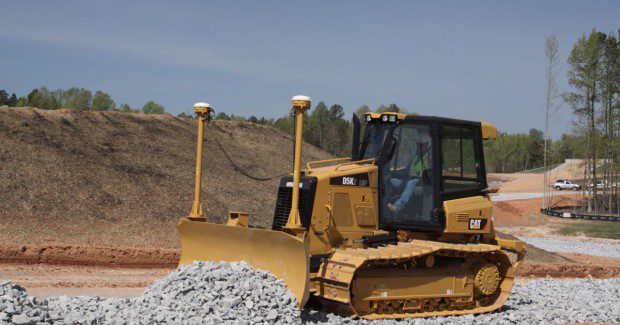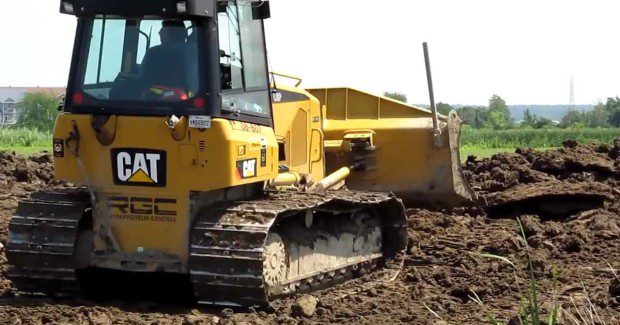Leveling the Field in Heavy Fabrication
Flattening a warped steel part that is nearly two inches thick is extremely difficult, even with a flattening press and a lot of experience. But for a heavy fabricator that uses one of the largest parts levelers in North America, it’s just a matter of setting a few parameters in the control and feeding the problem part into the machine, which hits it right on the first pass.
Posted: February 2, 2016
As specifications for flatness on steel plate parts become tighter and more common with heavy equipment OEMs in the U.S., O’Neal Manufacturing Services (OMS; Birmingham, AL) meets those requirements by using two parts levelers from ARKU Coil Systems Inc. (Cincinnati, OH) at its headquarters plant in Birmingham. One of them is the FlatMaster 120-200, the largest FlatMaster parts leveler in North America, capable of leveling plate parts up to 1.675 in thick and 78 in wide. The FlatMaster 120 is not the only thing unique about OMS, which is one of the largest manufacturers of complex metal fabrications for the heavy equipment industry. Its ten plants are each ISO 9001:2008 certified, offering 1.5 million sq ft of outsourcing support for OEMs in the agriculture, construction equipment, material handling, railroad and power generation industries.
OMS produces fabrications and welded assemblies for OEMs with a “Planned Demand” outsourcing strategy: they partner with key suppliers to provide long-term, forecastable and repeatable production that allows customers to truly focus on their core competencies. With decision making driven by long-term partnerships rather than short-term need, OMS and its customers are changing the dynamics of the supply chain. “Capital equipment purchases, including these flattening presses, are based upon our customer intimacy strategy,” noted Gerald Brockman, the vice president of sales and marketing at OMS. “All of our resources, whether capital, time or human, focus on enhancing long-term relationships with our key customers.”
One key customer involves their partnership with heavy equipment manufacturer Caterpillar Inc. (Peoria, IL). OMS supplies the parts for the Small Track Type Tractor series of bulldozers produced by Caterpillar at a facility near Athens, GA. This bulldozer was their first exposure to an original equipment manufacturer the scale of Caterpillar. Six other OMS facilities also supply parts for Caterpillar products. “They are a very important strategic customer for us,” said Brockman. Caterpillar moved its production of the bulldozer and an excavator from Japan to the Athens plant amid a reshoring initiative. “We’re thankful for the vote of confidence Caterpillar has given us,” added Craft O’Neal, the chairman of O’Neal Industries, the parent company of OMS.
https://youtu.be/jGqxY5Y87vs
The FlatMaster 120 leveler is a big step up from the FlatMaster 88 acquired for the company’s Greensboro plant in 2013. “Our Birmingham facility was quoting some business that required a tight flatness tolerance on parts larger and thicker than our machine in Greensboro could handle,” noted Gene Gadient, an application engineer at OMS. “We have a gantry flattening press that could do the work, but the part volume and variety, as well as our experience with the smaller FlatMaster, make the larger roller leveler a better solution. The gantry press is a trial-and-error method that takes an experienced operator. It may take several hits from both sides of a part to get it flat. With our FlatMaster in Greensboro, we set the control and the part typically comes out flat on the first pass, very flat.”
https://youtu.be/TyuYFIgE_JU
The contract for the Birmingham plant largely involves mild steel nearly one inch thick, with a minimum yield of 36 ksi to 50 ksi. The parts are cut from plate by laser or plasma machine, and vary widely in size and shape, some with openings. A typical flatness requirement is 0.07 in across a 60 in diameter. Circles, triangles and parts with openings are a particular challenge with a hammer press. “You can chase a high spot for quite a while. It’s a very inexact science,” explained Gadient. The ability to adapt the leveling force to varying shapes is what sets this plate leveler apart. Each part presents a changing cross section as the leading edge, center, and trailing edge enter the leveling rollers. These changing cross sections require varying levels of force to maintain the leveling gap. The servo-hydraulic system on the leveler can recognize any change in the required force in a fraction of a second and adjust to maintain a precise gap.
More than just leveling the part, the FlatMaster also stress relieves it, making it much easier to weld or bend. The levelers are available for part thicknesses up to 2.25 in. “We found in Greensboro there is a definite advantage to using flat parts in our downstream operations. It is a unique manufacturing asset,” said Gadient.
Unfortunately, in December 2015 the declining metals market leveled the manufacturing services of OMS and forced the consolidation of its Birmingham operations, where about 180 people work. Some of those employees may move to other OMS facilities elsewhere, or into other jobs at O’Neal Steel in Birmingham, but many will lose their jobs. The OMS Birmingham space is now being repurposed for O’Neal Steel Birmingham operations and most of the Birmingham OMS operations – including the parts leveling equipment – will be moved to the Greensboro plant by June 2016. Company officials explained that the declining metals market, which is experiencing the lowest steel prices since 2004, is the reason for the shift.
“We expect the industrial economy to remain challenging, at least through 2016. So we must be smart, efficient and effective to succeed,” said Craft O’Neal. He added that the move will not affect other Birmingham facilities. The parent company and O’Neal Steel’s largest distribution facility will remain intact. “We have always been a people-first company, so this is a heart-wrenching decision in terms of the people impacted by our consolidation,” noted O’Neal. “Our first concern is doing all we can to help the impacted employees.”
O’Neal Manufacturing Services, 744 41st Street North, Birmingham, AL 35212, 205-599-8100, www.onealmfgservices.com.
ARKU Coil Systems Inc., 11405 Grooms Road, Cincinnati, OH 45242, 513-985-0500, www.arku.com.


















